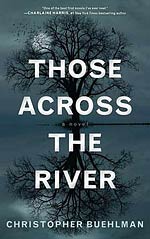
![]() Nymeria
Nymeria
9/17/2016
![]()
Right after the great find that was "The Lesser Dead", I wanted to read more of Christopher Buehlman's work and settled on this shortish novel set in the era of the Great Depression. Here the main character is former WWI soldier Frank Nichols, still haunted by nightmares about his war experiences: he lost his job as a history teacher after starting an affair with the young wife of a colleague with friends in high places, so that he and Dora - who divorced her husband to follow Frank - seem to find a break in their difficult situation when Frank's aunt leaves him a small inheritance and the deed to a house in Whitbrow, Georgia. Forsaking the aunt's warning about selling the house and never setting foot in the place, the two decide to start a new life: Dora will teach at the local school and Frank will write a book about the cruel history of a nearby plantation, owned by one of his ancestors and the theatre of a bloody slave revolt.
Shortly after arriving in Whitbrow, though, the couple starts hearing vague warnings about never walking in the woods across the river - curiously enough, the location of the old plantation - and they are faced with a strange ritual: every two months, the village's inhabitants release two pigs into the woods, following a tradition that seems almost festive, if it were not for the historical moment's privations and the need to provide for more urgent needs. It goes without saying that the collective decision to bow to the time's hardships will unleash an unstoppable chain of terrible events...
What's fascinating in this novel is that the truly supernatural horror, whose origin is revealed a good way into the story, seems to take almost second place to a different, and more human-related kind of dread. Whitbrow is a stagnant place, not only as a result of the Great Depression (even though its mark is deeply felt), but more as the product of an age-old torpor that has taken possession of the minds and souls of its inhabitants, and that quickly ensnares Frank as well. The drive to write his novel is soon drowned in the daily visits to the local store, where he engages in endless checkers games with the patrons under the guise of gathering background information for his story, but in truth succumbing to the timeless inertia that seems to be the village's modus vivendi.
Whitbrow's dullness goes hand in hand with a deeply rooted distrust of strangers, of those who are different: this extends to both out-of-owners (their quick acceptance of Frank due solely to his family ties) and the truly different, like the homeless moving across the land and, of course, black people. There are a few scenes where the animosity toward these "aliens" is shown in no uncertain terms: given the recurrence of this phenomenon in our present times, the unwillingness of some to extend human consideration toward the less fortunate "outsiders", these pages take on a far more chilling flavor than it was probably intended at the time they were written...
And then there is the closing of the villagers' minds to anything new, to the possibility of attaining something better in one's life: Dora's struggle to keep the children in school when their families prefer to steer them toward field work, is one such example. There is one situation in which she and Frank go to the home of one of her most gifted pupils, in the hope of offering her more advanced schooling, and the scene that Buehlman depicts is both historically accurate and vivid, as they are met with cold indifference and mulish refusal from the girl's father, and a sort of hopeless compliance from the daughter:
[...] looked up from the chicken she was plucking in the kitchen and peeked through the doorway, but she did not risk a hello. I guess she never knew exactly when to speak in this house, but with her daddy it was good to err in favor of silence.
After these all-too-real evils, the apparition of the true horror seems almost mundane, even though the discovery brings forth an abomination that goes back a long time, something that has always dwelled near the village - ignored and maybe conveniently forgotten. And this is where the story's magic fell somewhat short for me: from the opening's chilling preview to the big reveal there is an increasing sense of foreboding that unfortunately loses steam once the proverbial cat (or rather critter) is out of the bag and the carefully crafted buildup flounders in a great deal of anti-climatic exposition that does not fully realize the expectations I nurtured up to that moment.
All in all it was still a good read, but I'm sorry I cannot rate it as high as the previous book I sampled from this author, even though this slight disappointment will not prevent me from exploring further Mr. Buehlman's work.
http://spaceandsorcery.wordpress.com